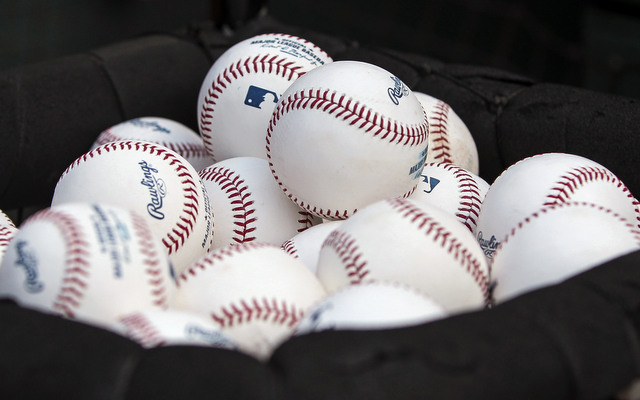MLB beefs up ball security after Deflategate
On Monday, the NFL announced New England Patriots quarterback Tom Brady has been suspended four games for Deflategate. The team was also fined and has to forfeit some draft picks, including a first rounder. Eye on Football has all the Deflategate coverage you could possibly need.
Although the discipline was handed down this week, Deflategate has been a story for several weeks now, and this season MLB decided to improve ball security in an effort to avoid a similar controversy, according to the Associated Press.
Starting this year, an MLB representative watches the baseballs while a clubhouse assistant carries them from the umpires’ room to the field.
And if the supply runs low during the game, an MLB security person is now sent to retrieve more from the umps’ room.
In the past, a ball boy or ball girl did those jobs alone.
While it’s easy to view this as a response to Deflategate, MLB was already considering new security measures before the Patriots were caught in the act. The Associated Press says equipment managers discussed the new policy at the Winter Meetings in December, weeks before the AFC Championship game.
Each team was advised of the new ball security policy prior to the start of the regular season as well.
Hoping to avoid a seamy situation, MLB sent a memo to all 30 teams before opening day with a nine-step procedure on ball handling. Along with the policy on storage — around 70 degrees, about 50 percent humidity — there were guidelines on chain of command.
Home teams store the new balls during the season, and the umpires’ clubhouse attendants usually rub up about eight dozen for each game.
When they’re taken to the field, an MLB authenticator follows them. That person is a current or former member of law enforcement hired by an outside company to document balls and other game-used items, often to be sold or given to charities.
If the ball supply is running out, a Resident Security Agent gets more. The RSAs also have police backgrounds and are hired by MLB.
Boy, MLB really isn’t messing around, huh? Of course, baseballs have a shorter on-field life span than footballs. Baseballs are hit into the stands (foul balls, etc.) or taken out of play (scuff marks) all the time, often multiple times per plate appearance. Doctoring a batch of baseballs the way the Patriots doctored footballs would take a lot of effort.
“Obviously, there’s not as much that you can do to baseballs,” said Angels lefty C.J. Wilson to the Associated Press. “I mean, you can’t change the density of the baseball at any point — unless you dunk them in water. Then they’re going to be 9 ounces, and everyone’s going to blow their arms out.”
The average game baseball weights 5 to 5 1/2 ounces. There’s no downside to the improved security policy other than the extra cost of security personnel, which is a drop in the bucket for the league. And if it helps avoid a Deflategate-like controversy, good! No MLB fan wants any part of that for many reasons.
 MLB has improved ball security around the league following Deflategate. (USATSI)
MLB has improved ball security around the league following Deflategate. (USATSI)
This entry passed through the Full-Text RSS service – if this is your content and you’re reading it on someone else’s site, please read the FAQ at fivefilters.org/content-only/faq.php#publishers.